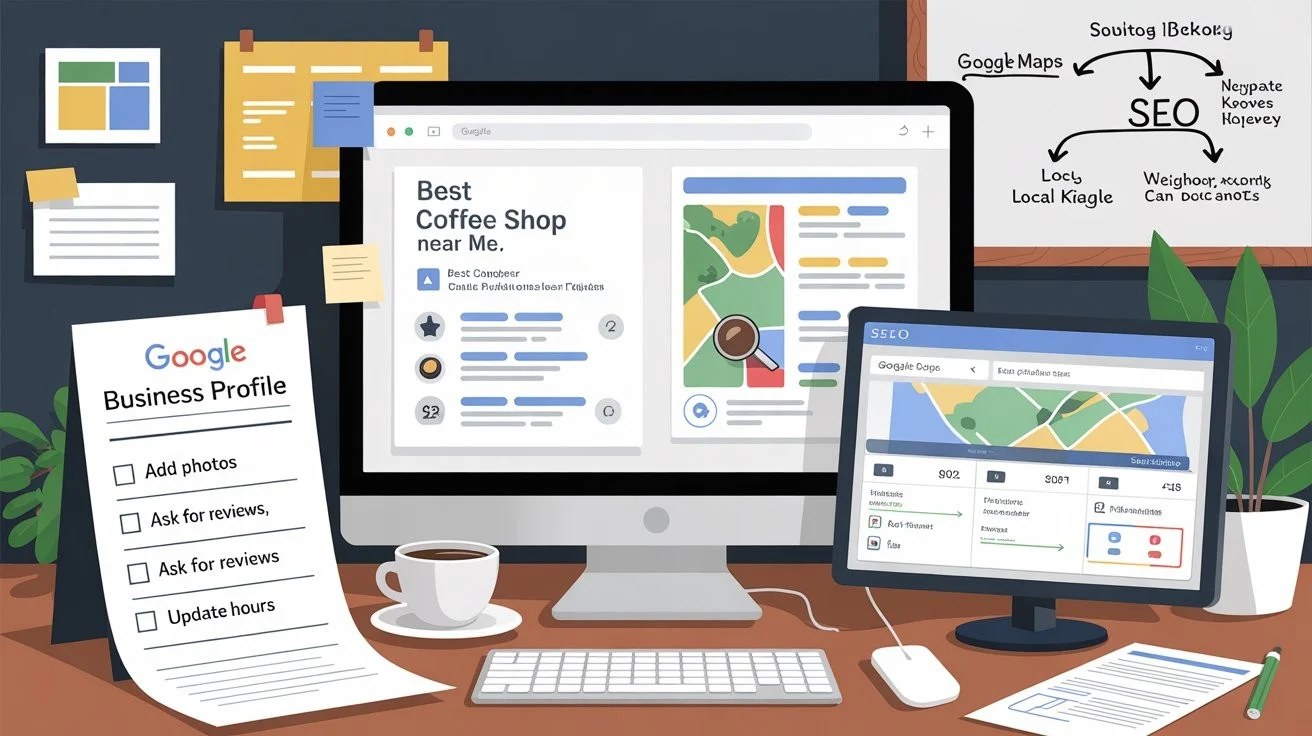Ever wondered why some businesses pop up first when you search for services nearby? Others seem to vanish. It’s all about mastering local SEO to connect with your community.
This complete guide will show you how local SEO works and why it’s key for your business. Unlike regular SEO, local SEO aims to attract customers in your area.

In this guide, I’ll share strategies that really work. Did you know 46% of Google searches are local? That’s nearly half of all searches looking for businesses near them.
You’ll learn SEO basics for local businesses, how to optimize your Google Business Profile, and the importance of local keyword research. I’ll also cover how to get more citations and reviews to boost your visibility.
By using these local SEO strategies, you’ll draw in more qualified leads and boost your revenue from local customers.
🗺️ Show Up on Maps, Not Just Dreams — Hire This Local SEO Pro Today
Table of Contents
Key Takeaways
- Local SEO helps businesses appear in search results when nearby customers look for their services
- 46% of Google searches have local intent, making local visibility key for business success
- Optimizing your Google Business Profile is vital for local search rankings
- Local keyword research is different from traditional SEO, focusing on geographic terms
- Building citations and earning positive reviews greatly improve local search visibility
- Local SEO strategies attract qualified leads and increase revenue from nearby customers
Understanding Local SEO and Why It Matters for Your Business
Local search behavior has changed how businesses reach out to their community. This shift offers unique growth opportunities. As a local business owner, I’ve seen how it changes customer attraction.
Local searches lead to immediate action. Unlike general web searches, local searchers are ready to act fast.
What Makes Local SEO Different from Traditional SEO
Traditional SEO targets a global audience. Local SEO focuses on your local area and nearby customers. Google ranks local results based on relevance, distance, and prominence.
Relevance checks if your business fits the search. Distance looks at how close you are. Prominence checks your online and offline presence.
Local intent changes everything. For example, someone searching “pizza delivery” wants options nearby, not far away.
The Impact of Local Search on Business Revenue
Local search directly affects your revenue. Studies show local customers convert at higher rates than general web traffic. They’re already interested and in your area.
The link between online discovery and physical visits boosts revenue. Local searches often lead to same-day purchases or visits, which are very valuable for brick-and-mortar businesses.
Local Search Statistics Every Business Owner Should Know
The numbers show the power of local relevance:
| Statistic | Percentage | Impact |
|---|---|---|
| Searchers choosing first page results | 92% | High visibility is key |
| Consumers visiting nearby stores | 72% | Within 5-mile radius |
| “Near me” search growth | 500% | Mobile-driven trend |
| Local search leading to purchases | 78% | Within 24 hours |
These stats show local SEO is not optional. It’s essential for capturing customers already looking for your services in your area.
Setting Up Your Google Business Profile for Maximum Visibility
A well-optimized Google Business Profile can boost your local search rankings. It’s a free tool from Google that acts as your digital storefront. It shows up in google map results when people search for businesses like yours. I’ll show you how to make your profile stand out in local search.
Your Google Business Profile is key to showing Google what your business is about. Businesses with complete profiles get 70% more visits than those without.
Creating and Verifying Your Google Business Profile
First, go to the Google Business Profile website and click “Manage now.” Put in your business name exactly as it’s on your storefront and official documents. Being consistent is key for local SEO.
Then, add your full address and phone number. Google will check if your business is where you say it is. You can choose from a few ways to verify your business:
- Postcard verification: Google sends a postcard with a code
- Phone verification: You get a call with your code
- Email verification: You get your code via email (for some businesses)
Verification by postcard takes 1-2 weeks. Wait until it’s done before you optimize your profile further.
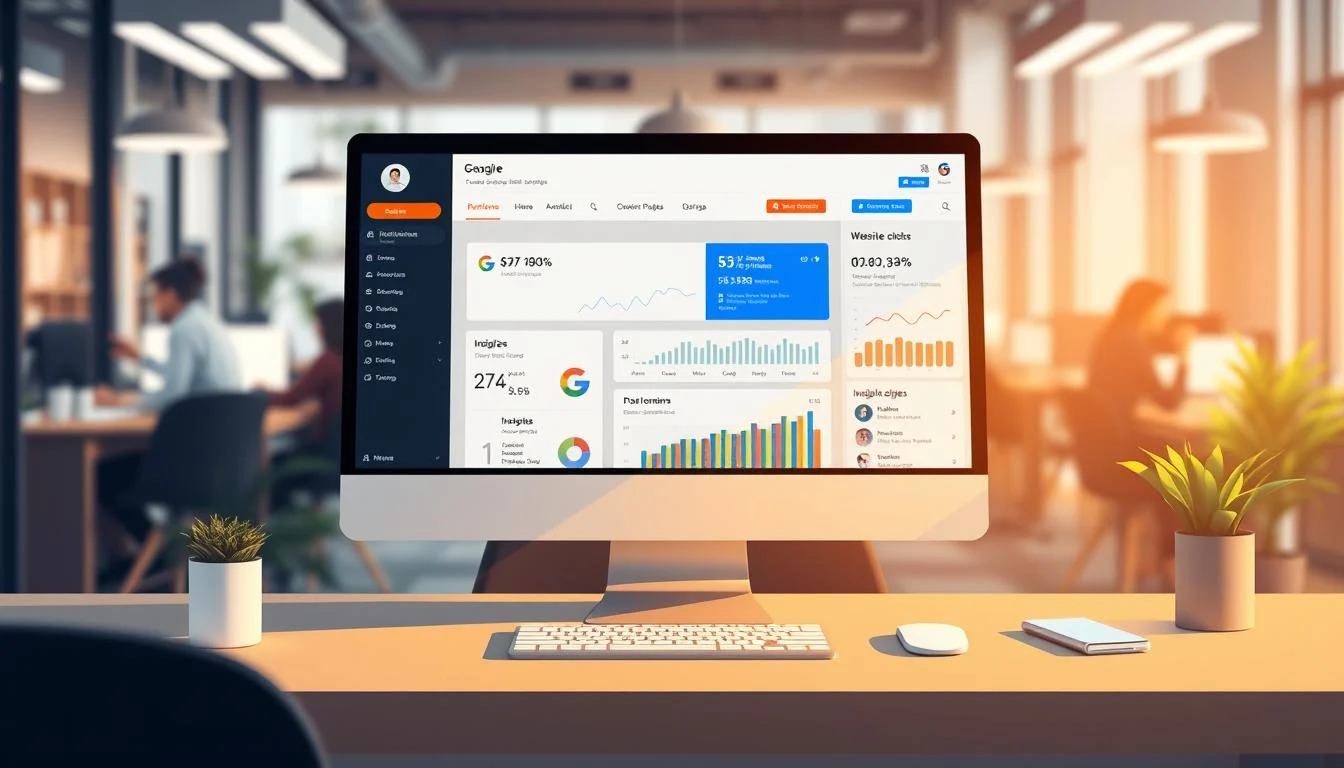
Optimizing Your Business Information and Categories
Pick your main business category wisely. It affects when your profile shows up in searches. Choose the most specific category that describes your business.
Add extra categories for more services. For example, a restaurant might add “Pizza restaurant” and “Italian restaurant” as extras. Fill out every field you can, like:
- Business hours (including holidays)
- Website URL
- Business description (750 characters max)
- Services offered
- Payment methods accepted
Adding Photos, Posts, and Regular Updates
Upload great photos of your business, inside and out, and your products and team. Businesses with photos get 42% more directions requests and 35% more website clicks.
Make regular posts to keep your profile fresh. Share news about new products, special deals, or events. Posts stay on your profile for seven days, so post often.
Use google search console insights to check how people find your business. See what actions they take. This info helps you improve your local search strategy.
🛠️ Fix Your Google Business Profile & Rank Higher — This Freelancer’s Got You
Local Search Engine Optimization Keyword Research and Strategy
Understanding what your customers are searching for is key to local SEO. Local keyword research connects you with people needing immediate help. By mastering this, you’ll find valuable search terms that bring in qualified leads.
Local keyword research is precise. Unlike national businesses, you can focus on specific local search queries. This targeted approach often leads to better conversion rates because people are ready to act.
Finding Local Keywords That Drive Traffic
Start with Google Suggest and Yelp Suggest for local SEO tools. Type your service into Google’s search bar to see autocomplete suggestions. These show real search queries in your area.
Look for both explicit location-based terms and generic keywords that trigger local results. Many search for “emergency plumber” without their city name. Yet, Google shows local businesses. These terms have less competition but bring in qualified traffic.

Voice search is changing how we find local businesses. Voice queries tend to be longer and more conversational. Include natural language phrases in your research. Instead of just targeting “pizza delivery,” consider “where can I get pizza delivered near me” or “best pizza place open now.”
Understanding Local Search Intent and User Behavior
Local search intent includes informational, navigational, and transactional searches. Understanding these differences helps you create content that matches exactly what searchers want. Someone searching “hours for coffee shop downtown” has different needs than someone searching “best coffee shop reviews.”
Analyze the search results for your target keywords to understand user behavior patterns. If Google shows a map pack, reviews, or business hours prominently, these elements matter to searchers. Your local search ranking improves when you provide the information people actually seek.
“Local search is about being found at the exact moment when someone needs what you offer, exactly where you offer it.”
Creating a Local Keyword Map for Your Business
A local keyword map organizes how customers search for your services. Start by listing your main services, then brainstorm every possible way people might describe them. Include seasonal variations, emergency terms, and different skill levels or price points.
Group your keywords by search intent and location specificity. This organization helps you prioritize which terms to target first. Remember, the best local keyword often isn’t the one with the highest search volume, but the one that brings you the most qualified customers.
Optimizing Your Website for Local Search Rankings
To make your website a local search leader, use key optimization techniques. These help search engines understand your business. Your site is the base for all local SEO efforts. Proper optimization makes your site more visible in local searches.
Blend traditional SEO with local strategies. This way, your business shows up when people search for services near you.
On-Page SEO Elements for Local Businesses
On-page SEO is vital for local search success. Use your main keyword and city name in title tags. For instance, “Best Pizza Restaurant in Downtown Chicago” is better than a generic title.
Meta descriptions should also focus on location and main service. Keep it under 160 characters. This makes your business stand out in search engine results pages.
Header tags (H1, H2, H3) should naturally include location keywords. For example, “Professional Plumbing Services in Austin, Texas” is better than “Plumbing Services.”
URL structure is important too. Use clean URLs with location info: “/austin-plumbing-services” is better than “/services-page-1”.
Creating Location-Specific Landing Pages
Businesses with multiple locations need unique landing pages for each. Each page should have valuable content specific to that location.
Avoid duplicate content by writing unique descriptions for each location. Include local landmarks, neighborhood info, and area-specific services. This boosts your ranking factors.
Use customer testimonials from each location when you can. Local reviews and testimonials strengthen your local presence.
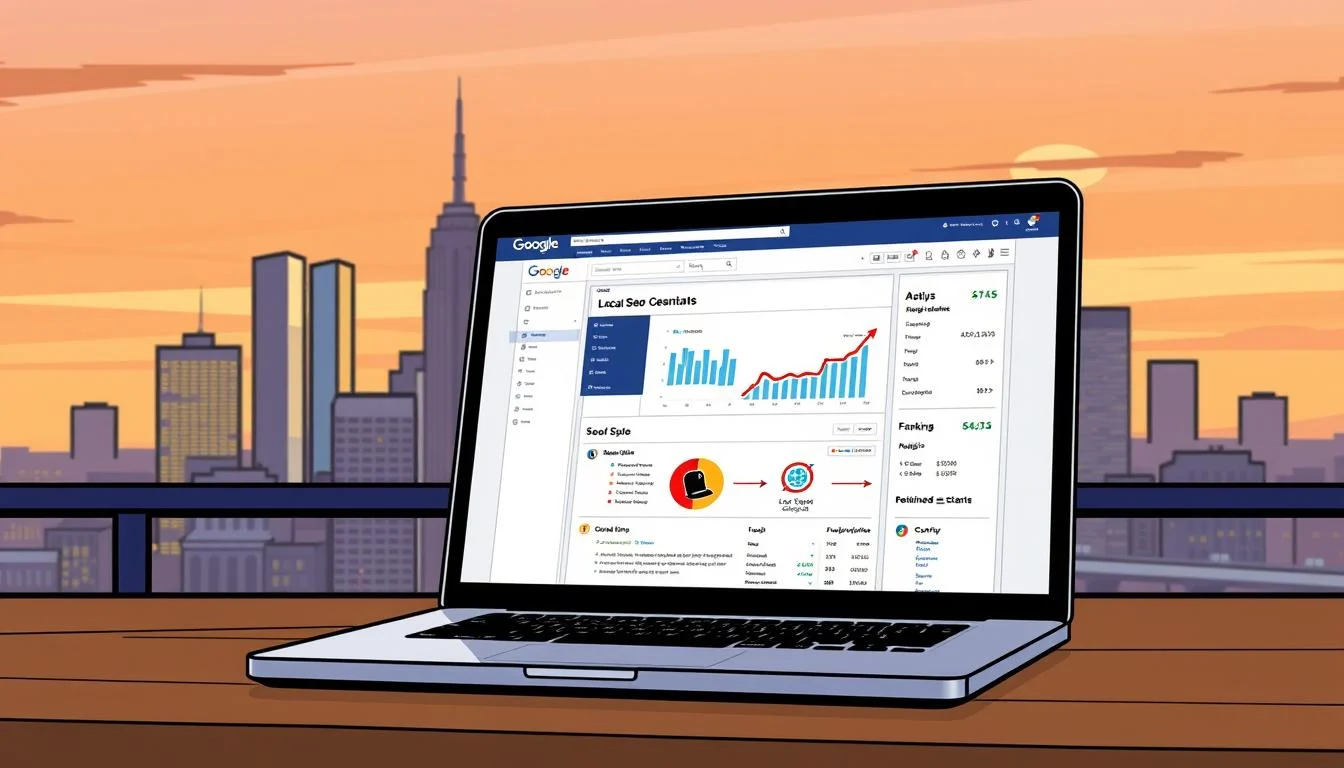
Schema Markup and Structured Data Implementation
Schema markup gives search engines detailed business info in an easy-to-understand format. It includes your name, address, phone number, hours, and services.
The search algorithm uses this data to create rich snippets in search results. These enhanced listings often include business hours, ratings, and contact info directly in search results.
Review schema markup displays star ratings in search results. This visual element boosts click-through rates from search results.
Mobile Optimization for Local Searchers
Mobile optimization is key, as most local searches are done on smartphones. Your site must load fast and look good on all screen sizes.
Page speed affects your SEO rankings. Compress images, minimize code, and use reliable hosting to speed up your site.
Click-to-call buttons make it easy for mobile users to contact you. This improves user experience and can lead to more conversions.
Make sure your contact info is easy to find on mobile devices. Local searchers want quick access to your phone number and address.
🏙️ If You’re Not on the Local Map, You’re Missing Sales — Hire This Pro Now
Building Local Citations and Managing Your Online Reputation
Local citations and online reputation are key to being seen in local searches. They show trust signals to search engines. I’ll show you how to build strong citations and keep a good online image.
Your business info must match everywhere online to show authority. Search engines check your details from different places to see if you’re real. When your info is the same everywhere, you get a big boost in local ranking factors.
Creating Consistent NAP Citations Across Directories
NAP means Name, Address, and Phone number. These must be the same everywhere online. Google checks your NAP info to make sure it’s right everywhere.
Start by claiming your profiles on big local business directories like Yelp and Yellow Pages. Make sure your NAP info is the same as your Google Business Profile. Keep a document with your business info to stay consistent.
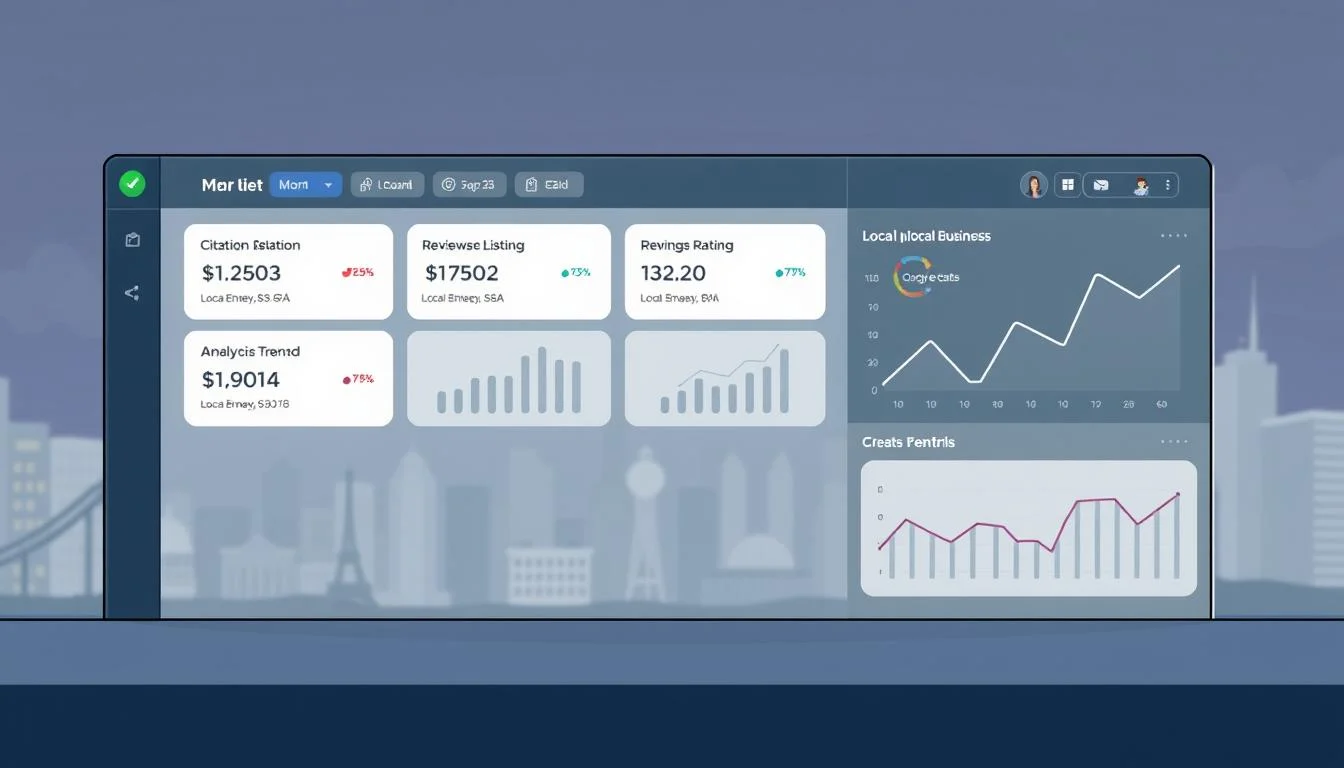
It’s better to have a few high-quality citations than many low-quality ones. Studies show businesses with consistent citations in 50+ directories do better in local searches.
Managing Reviews and Customer Feedback
Reviews help you show up in local search results. Google looks at how recent, frequent, and varied your reviews are. Fresh reviews show you’re active and trustworthy.
Ask happy customers to leave reviews by making it easy. Send emails with links to your review profiles. Always thank positive reviewers and address negative feedback well.
How often you get new reviews matters a lot for local searches. Aim for 2-4 new reviews each month. This is better than getting a lot of reviews all at once and then none for months.
Monitoring Your Online Reputation
Use Google Alerts to keep track of mentions of your business. Watch reviews, social media, and local forums. Quick responses to feedback show you value customer opinions.
Tools like BirdEye or Podium help manage your reputation across many platforms. They alert you to new reviews and make responding easier. Regular checks prevent small issues from becoming big problems that hurt your rankings.
Local Link Building Strategies That Actually Work
Smart local link building strategies can really boost your organic search results. Studies show that link building is key for local rankings, making it vital for local SEO success. I’ve seen how focusing on community-based link building can change a business’s online presence.
Building real connections in your local community is the key. Working with nearby businesses and organizations opens up chances for natural link exchanges. These are highly valued by search engines.

Building Relationships with Local Businesses and Organizations
Start with your local chamber of commerce and business associations. They often have directories that offer great local link opportunities. Building authentic relationships takes time, but it’s worth it.
Team up with businesses that complement yours. For instance, a wedding photographer might work with local venues, florists, and caterers. This creates chances for local link exchanges that help your SEO.
Creating Locally-Relevant Content That Earns Links
Create content that talks about local topics to attract links. Write about local events, highlight local businesses, or make neighborhood guides. This content helps people find local info and makes your business a community resource.
Local news outlets and bloggers look for community-focused stories. When you make valuable local content, you’re more likely to get mentions and links from these important sources.
Participating in Community Events and Sponsorships
Being part of events gives you many link chances from organizer sites, local media, and participant lists. Local events are great for networking and can lead to lasting business relationships and link exchanges.
Sponsoring community activities, sports teams, or charities usually means getting website recognition with backlinks. These efforts not only help your community but also make your business a local leader. This helps you rank higher in local search results.
📢 Local Search Is Hot — This Freelancer Knows How to Get You to the Top Fast
Leveraging Social Media and Local Community Engagement
Your social media strategy is key to boosting your presence in search results and connecting with your local community. Social media doesn’t directly affect rankings but offers chances for more visibility and engagement. By using smart social media tactics, you can help people find your local business through various channels.

Boosting Local Visibility Through Social Platforms
Each social platform has its own way to improve your search visibility in your area. Begin by making your profiles complete with your address, phone number, and website.
Use location tags and local hashtags in your posts. Instagram and Facebook let you tag your exact location, helping locals find your content. LinkedIn is great for B2B connections in your community.
Share customer feedback and show off your local products often. These posts can attract new customers and boost engagement.
Community Events and Local Activities
Getting involved in local events creates content and builds relationships. Share updates from festivals, charity events, or business meetings.
Collaborate with other local businesses for promotions. Supporting each other on social media can expand your reach and strengthen your business in local networks.
Make event-specific hashtags and ask attendees to use them. This boosts your content’s visibility and shows your community involvement.
Location-Based Content Creation
Create content that shows your connection to the local area. Share behind-the-scenes looks, introduce your team, and highlight local landmarks or partnerships.
Post about local news, weather, or achievements that matter to your business. This makes you seem like a community-focused business, not just another company.
Include geo-specific keywords in your captions and descriptions. This helps your content show up in search results for local searches and supports your SEO.
Measuring Your Local SEO Success and Making Improvements
It’s key to track your local SEO to see what works for your business. Without tracking, you’re working without sight and missing chances to boost your online presence. Set up a regular check to guide your marketing choices with solid data.
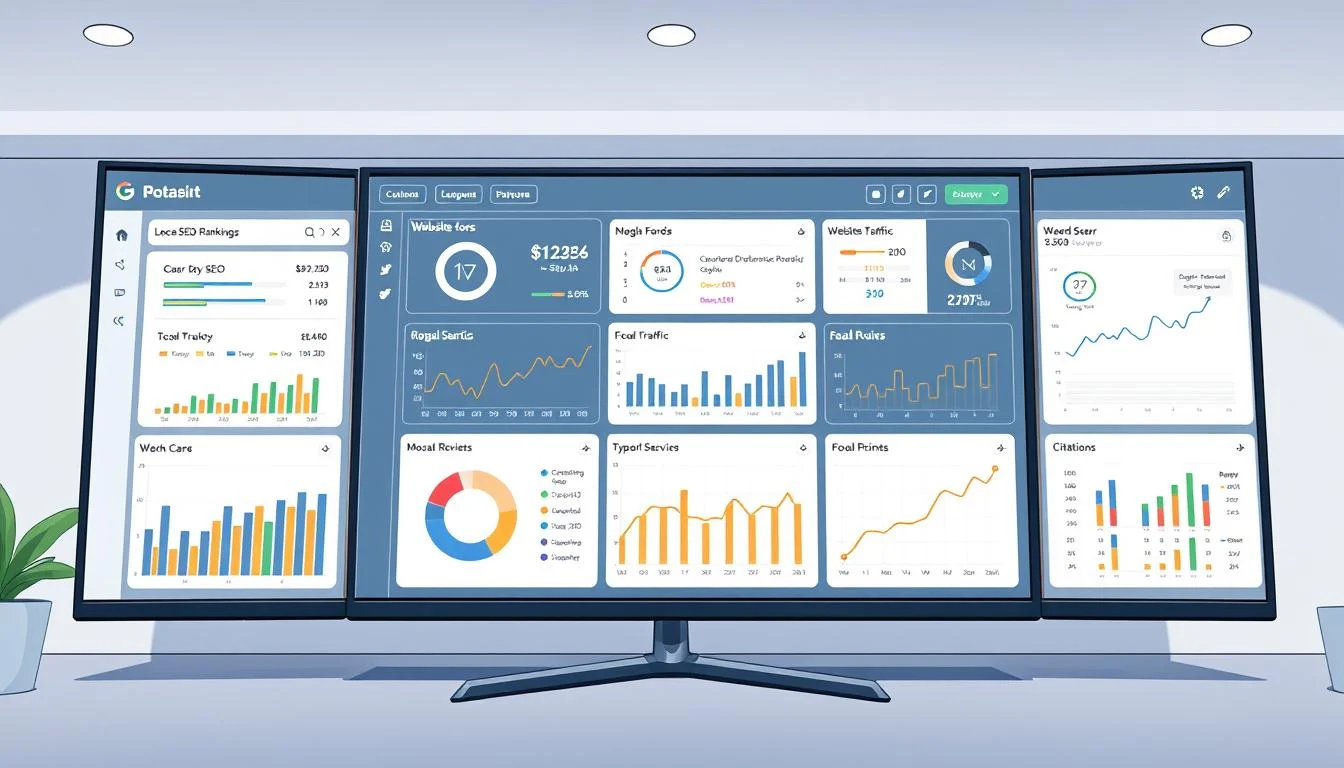
Key Performance Indicators Worth Monitoring
Focus on a few key areas for your local seo efforts. Map pack rankings show your spot in local results. Organic local rankings track your spot in google search results for local searches.
Other important metrics include:
- Click-through rates from search results on google
- Phone calls and direction requests from your Google Business Profile
- Website traffic from relevant local searches
- Conversion rates from local visitors
- Review ratings and response rates
Local Falcon gives detailed ranking data by location. This shows how your rankings in google search change by area.
Leveraging Analytics Platforms for Local Insights
Google Analytics and Search Console offer deep insights into your local search performance. They show which local keywords bring the most traffic. They also show where your visitors come from.
Use Google Analytics to track local search conversions. Check your google search reports to spot trending keywords and seasonal changes.
Recognizing When Professional Help Makes Sense
At times, your business needs extra help to get better results. Think about hiring pros when your local seo efforts stall or managing many locations gets too hard.
An seo expert can offer advanced strategies and top-notch seo tools for better outcomes. If you need help with your local SEO, look for freelancers on platforms that match businesses with SEO pros.
Professional help is a big plus for tackling technical issues, algorithm updates, or tough markets. Even small improvements can greatly increase your revenue.
Taking Your Local Business to the Next Level
Local seo can change how people see your business in your area. This guide has shown you how to make your business more visible. It helps customers find you when they need your help.
To succeed, keep using these local seo tips every day. Start by optimizing your Google Business Profile. Also, build citations and manage your online reputation. These steps boost your local search rankings.
Local seo needs constant work. SEO has changed a lot, and keeping up is key to staying ahead. Spend time each month updating your info, answering reviews, and making new content for your local customers.
These strategies take time and effort. You won’t see quick results, but keep doing them and you’ll get better. Local seo is vital for any business that serves a specific area.
Start with one or two strategies that fit your schedule. Learn those well before moving on to harder ones. Your local community is looking for businesses like yours. Make sure they can find you.
🚨 Google Maps Listings Are the New Front Door — This SEO Pro Gets You In
FAQ
What exactly is local SEO and how does it differ from traditional SEO?
Local SEO helps your business show up in searches for people nearby. It’s different from traditional SEO, which aims for national or global rankings. With local SEO, you focus on being found by people searching for businesses near them. It involves optimizing your Google Business Profile and building local citations. You also create content that shows you’re relevant to your area. Plus, being close to the searcher is a big factor in local rankings.
How long does it take to see results from local SEO efforts?
Local SEO results usually take 3-6 months to show up. But, some quick wins like Google Business Profile optimization can happen faster. The time it takes depends on your current online presence, local competition, and how often you optimize. Getting local citations and reviews takes time. But, making your website more technical can improve your visibility faster. Remember, local SEO is an ongoing effort that needs consistent work to keep improving.
Do I really need a Google Business Profile for local SEO success?
Yes, you absolutely need a Google Business Profile for local SEO success. It’s the key to being seen in Google’s local pack and map results. Without it, you’re invisible to local searchers. Your Google Business Profile lets you control how your business appears in search results. It also allows customers to leave reviews and gives you insights on how people find your business. It’s free and super important for local search rankings.
What are local citations and why are they important for my business?
Local citations are mentions of your business online, like on Yelp or Yellow Pages. They show search engines your business is real and local. Having consistent information across all citations builds trust and improves your local search rankings. But, if your information is inconsistent, it can confuse search engines and hurt your visibility. So, keeping your information accurate everywhere is key.
How important are customer reviews for local search rankings?
Customer reviews are very important for local SEO. They’re a top factor in local search rankings. Reviews provide valuable content to search engines and influence people’s decisions to visit your business. Positive reviews can make you more visible in local search results. The number and recentness of reviews also matter. Plus, responding to reviews shows you care and can improve your local search performance.
Can I do local SEO myself, or do I need to hire a professional?
You can do some local SEO tasks yourself, like setting up your Google Business Profile and creating location-specific content. But, technical tasks like schema markup and advanced keyword research might need a pro. Consider hiring help if you’re short on time, have multiple locations, or face tough competition. It comes down to your budget, skills, and time to dedicate to local SEO.
How do I optimize my website for local search without multiple locations?
For single-location businesses, naturally include your city and region in your website content. Create pages for specific areas you serve and add your address and phone number on every page. Use local business schema markup to help search engines understand your location. Create content about local events and partnerships. And, make sure your website works well on mobile devices, as most local searches happen on phones.
What local keywords should I target for my business?
Target keywords that include your products or services and location, like “pizza delivery Chicago” or “dentist near me.” Use Google Suggest to find localsearch terms people use. Don’t forget about neighborhood-specific keywords. Consider voice search queries, which are more conversational. Focus on keywords that show someone is ready to visit or contact a local business. These keywords usually have higher conversion rates.
How can social media help with my local SEO strategy?
Social media boosts your online visibility and engagement in your local community. Use location-based hashtags and geo-tag your posts. Share content about local events and partnerships. Social platforms help you connect with other local businesses and customers. This can lead to more reviews, citations, and backlinks. While social signals aren’t direct ranking factors, they can indirectly improve your local search performance and drive more traffic.
What metrics should I track to measure my local SEO success?
Track your rankings in Google’s local pack for important local keywords. Monitor your Google Business Profile insights for views and actions. And, measure local organic traffic in Google Analytics. Look at click-through rates, phone calls, and direction requests from your listing. Monitor your online reviews and ratings across platforms. Track local citation consistency and measure conversions from local search traffic. Use Google Search Console to see which local keywords drive impressions and clicks to your website.
Related Articles:
- Why is Search Engine Marketing Important? : Essential Benefits & Winning Strategies
- What is Generative Engine Optimization (GEO): The Revolutionary Shift in SEO?
- SEO: How Important is Search Engine Optimization?
- eCommerce SEO Service: Your Top eCommerce SEO Agency for Online Retailers
- Video SEO Service: YouTube Search Engine Optimization, Boost Your Online Visibility
This post contains affiliate links, which means I may earn a commission if you make a purchase through these links. There is no additional charge to you! Thank you for supporting my blog so I can continue creating free content each week!

